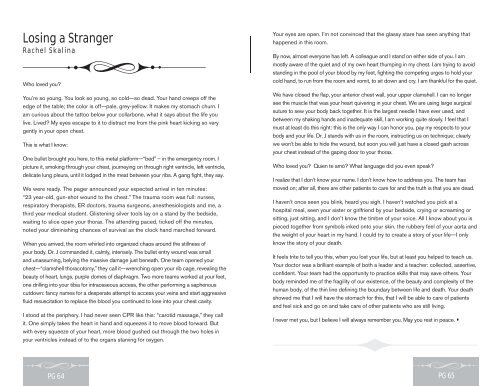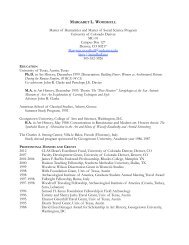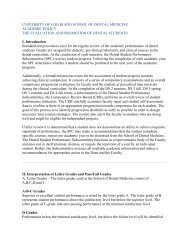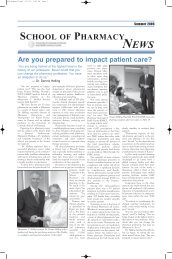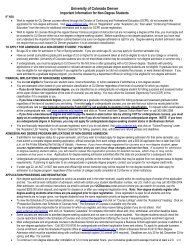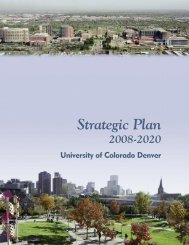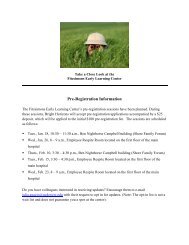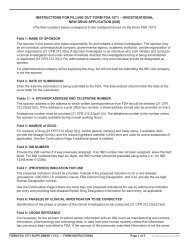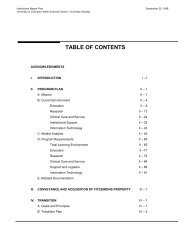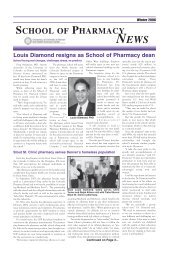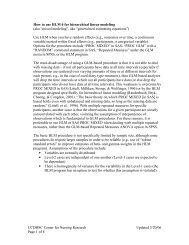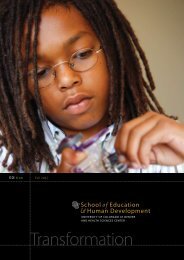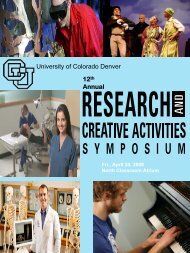The Human Touch 2013 - University of Colorado Denver
The Human Touch 2013 - University of Colorado Denver
The Human Touch 2013 - University of Colorado Denver
You also want an ePaper? Increase the reach of your titles
YUMPU automatically turns print PDFs into web optimized ePapers that Google loves.
Losing a Stranger<br />
Rachel Skalina<br />
Who loved you?<br />
You’re so young. You look so young, so cold—so dead. Your hand creeps <strong>of</strong>f the<br />
edge <strong>of</strong> the table; the color is <strong>of</strong>f—pale, grey-yellow. It makes my stomach churn. I<br />
am curious about the tattoo below your collarbone, what it says about the life you<br />
live. Lived? My eyes escape to it to distract me from the pink heart kicking so very<br />
gently in your open chest.<br />
This is what I know:<br />
One bullet brought you here, to this metal platform—“bed” – in the emergency room. I<br />
picture it, smoking through your chest, journeying on through right ventricle, left ventricle,<br />
delicate lung pleura, until it lodged in the meat between your ribs. A gang fi ght, they say.<br />
We were ready. <strong>The</strong> pager announced your expected arrival in ten minutes:<br />
“23 year-old, gun-shot wound to the chest.” <strong>The</strong> trauma room was full: nurses,<br />
respiratory therapists, ER doctors, trauma surgeons, anesthesiologists and me, a<br />
third year medical student. Glistening silver tools lay on a stand by the bedside,<br />
waiting to slice open your thorax. <strong>The</strong> attending paced, ticked <strong>of</strong>f the minutes,<br />
noted your diminishing chances <strong>of</strong> survival as the clock hand marched forward.<br />
When you arrived, the room whirled into organized chaos around the stillness <strong>of</strong><br />
your body. Dr. J commanded it, calmly, intensely. <strong>The</strong> bullet entry wound was small<br />
and unassuming, belying the massive damage just beneath. One team opened your<br />
chest—“clamshell thoracotomy,” they call it—wrenching open your rib cage, revealing the<br />
beauty <strong>of</strong> heart, lungs, purple domes <strong>of</strong> diaphragm. Two more teams worked at your feet,<br />
one drilling into your tibia for intraosseous access, the other performing a saphenous<br />
cutdown: fancy names for a desperate attempt to access your veins and start aggressive<br />
fl uid resuscitation to replace the blood you continued to lose into your chest cavity.<br />
I stood at the periphery. I had never seen CPR like this: “carotid massage,” they call<br />
it. One simply takes the heart in hand and squeezes it to move blood forward. But<br />
with every squeeze <strong>of</strong> your heart, more blood gushed out through the two holes in<br />
your ventricles instead <strong>of</strong> to the organs starving for oxygen.<br />
Your eyes are open. I’m not convinced that the glassy stare has seen anything that<br />
happened in this room.<br />
By now, almost everyone has left. A colleague and I stand on either side <strong>of</strong> you. I am<br />
mostly aware <strong>of</strong> the quiet and <strong>of</strong> my own heart thumping in my chest. I am trying to avoid<br />
standing in the pool <strong>of</strong> your blood by my feet, fi ghting the competing urges to hold your<br />
cold hand, to run from the room and vomit, to sit down and cry. I am thankful for the quiet.<br />
We have closed the fl ap, your anterior chest wall, your upper clamshell. I can no longer<br />
see the muscle that was your heart quivering in your chest. We are using large surgical<br />
suture to sew your body back together. It is the largest needle I have ever used, and<br />
between my shaking hands and inadequate skill, I am working quite slowly. I feel that I<br />
must at least do this right: this is the only way I can honor you, pay my respects to your<br />
body and your life. Dr. J stands with us in the room, instructing us on technique; clearly<br />
we won’t be able to hide the wound, but soon you will just have a closed gash across<br />
your chest instead <strong>of</strong> the gaping door to your thorax.<br />
Who loved you? Quien te amó? What language did you even speak?<br />
I realize that I don’t know your name. I don’t know how to address you. <strong>The</strong> team has<br />
moved on; after all, there are other patients to care for and the truth is that you are dead.<br />
I haven’t once seen you blink, heard you sigh. I haven’t watched you pick at a<br />
hospital meal, seen your sister or girlfriend by your bedside, crying or screaming or<br />
sitting, just sitting, and I don’t know the timbre <strong>of</strong> your voice. All I know about you is<br />
pieced together from symbols inked onto your skin, the rubbery feel <strong>of</strong> your aorta and<br />
the weight <strong>of</strong> your heart in my hand. I could try to create a story <strong>of</strong> your life—I only<br />
know the story <strong>of</strong> your death.<br />
It feels trite to tell you this, when you lost your life, but at least you helped to teach us.<br />
Your doctor was a brilliant example <strong>of</strong> both a leader and a teacher: collected, assertive,<br />
confi dent. Your team had the opportunity to practice skills that may save others. Your<br />
body reminded me <strong>of</strong> the fragility <strong>of</strong> our existence, <strong>of</strong> the beauty and complexity <strong>of</strong> the<br />
human body, <strong>of</strong> the thin line defi ning the boundary between life and death. Your death<br />
showed me that I will have the stomach for this, that I will be able to care <strong>of</strong> patients<br />
and feel sick and go on and take care <strong>of</strong> other patients who are still living.<br />
I never met you, but I believe I will always remember you. May you rest in peace. •<br />
PG 64<br />
PG 65


